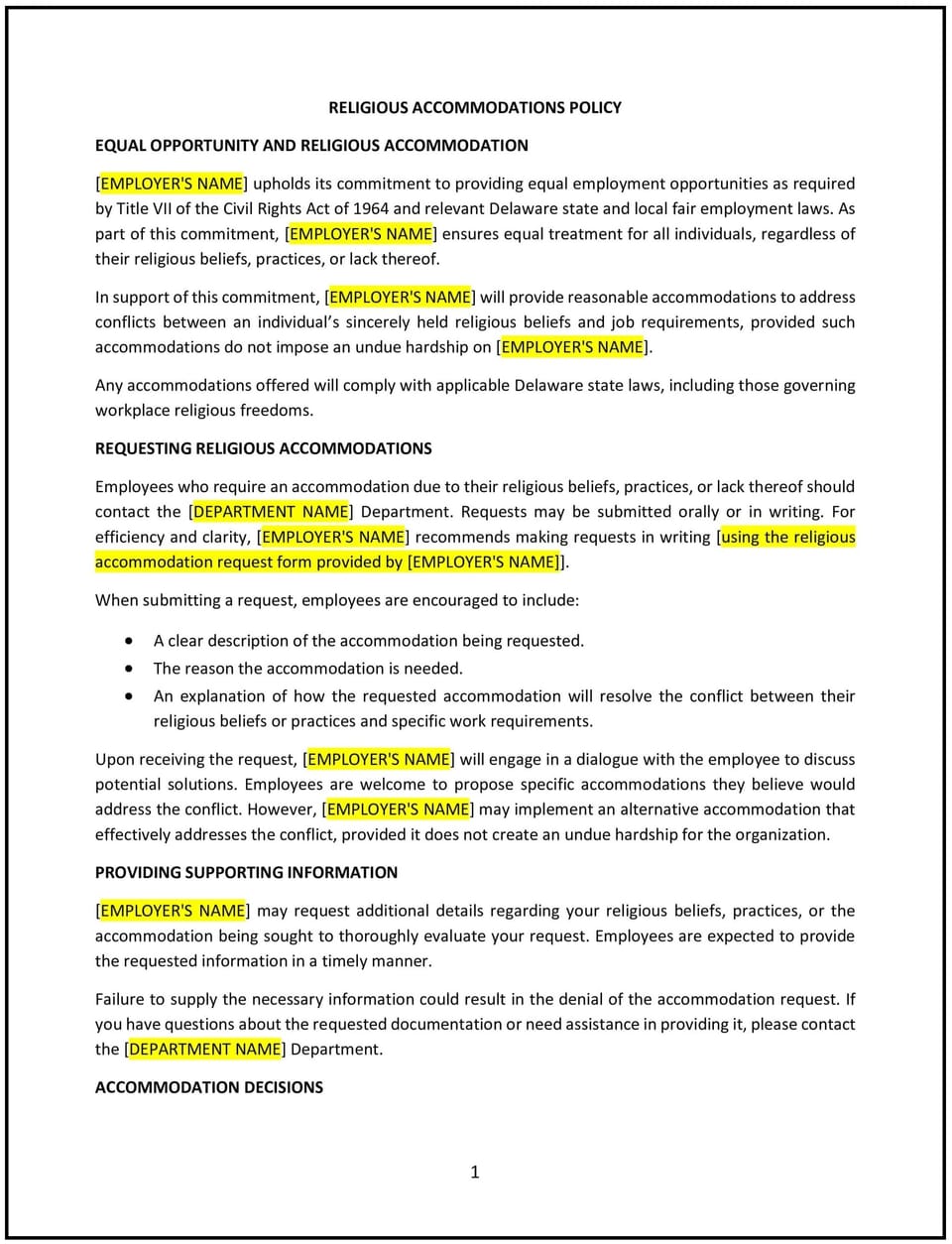Religious accommodations policy (Delaware): Free template

Religious accommodations policy (Delaware)
A religious accommodations policy helps Delaware businesses provide a framework for supporting employees’ religious practices while maintaining compliance with Delaware and federal anti-discrimination laws, such as Title VII of the Civil Rights Act. This policy outlines procedures for requesting accommodations, evaluating requests, and fostering inclusivity.
By implementing this policy, businesses can create a respectful workplace, ensure legal compliance, and support employees’ religious needs.
How to use this religious accommodations policy (Delaware)
- Define accommodations: Specify examples of religious accommodations, such as schedule adjustments, dress code modifications, or prayer spaces.
- Establish request procedures: Outline steps for employees to request accommodations, including submitting written requests and providing necessary documentation.
- Evaluate requests: Detail how the company will review and respond to requests, considering the reasonableness and potential impact on business operations.
- Provide training: Equip managers and HR personnel with knowledge about religious accommodations and anti-discrimination laws to handle requests fairly.
- Ensure confidentiality: Emphasize that requests and related information will be kept confidential and shared only with relevant personnel.
- Monitor and adjust: Regularly assess accommodations to ensure they meet employee needs and align with business operations.
Benefits of using this religious accommodations policy (Delaware)
This policy offers several benefits for Delaware businesses:
- Ensures compliance: Aligns with Delaware and federal anti-discrimination laws, reducing the risk of legal disputes.
- Promotes inclusivity: Supports a diverse workforce by accommodating employees’ religious practices and fostering respect.
- Enhances employee satisfaction: Demonstrates the company’s commitment to meeting employees’ religious needs, improving morale and retention.
- Reduces conflicts: Provides a structured process for managing accommodation requests, minimizing misunderstandings.
- Protects company reputation: Positions the business as an inclusive and respectful employer, appealing to both employees and customers.
Tips for using this religious accommodations policy (Delaware)
- Communicate the policy clearly: Ensure all employees understand their rights and the procedures for requesting accommodations.
- Train staff: Provide managers and HR personnel with training on religious accommodation laws and best practices.
- Encourage open dialogue: Foster a culture where employees feel comfortable discussing religious needs without fear of judgment or retaliation.
- Document decisions: Maintain records of accommodation requests, evaluations, and outcomes to ensure transparency and compliance.
- Review regularly: Update the policy to reflect changes in Delaware laws, federal regulations, or workplace needs.
Q: Why is a religious accommodations policy important for my business?
A: This policy ensures compliance with anti-discrimination laws, supports a diverse workforce, and fosters an inclusive workplace culture.
Q: What types of accommodations might be required under this policy?
A: Accommodations may include schedule adjustments for religious observances, modifications to dress codes, or providing space for prayer or meditation.
Q: How should businesses evaluate accommodation requests?
A: Requests should be evaluated on a case-by-case basis, considering the reasonableness of the accommodation and its impact on business operations.
Q: Can a business deny a religious accommodation request?
A: Businesses may deny a request if it imposes an undue hardship, such as significant operational disruption or excessive cost, but must document the reasoning.
Q: How often should this policy be reviewed?
A: This policy should be reviewed annually or whenever Delaware laws, federal regulations, or workplace practices regarding religious accommodations change to ensure continued compliance and effectiveness.
This article contains general legal information and does not contain legal advice. Cobrief is not a law firm or a substitute for an attorney or law firm. The law is complex and changes often. For legal advice, please ask a lawyer.


